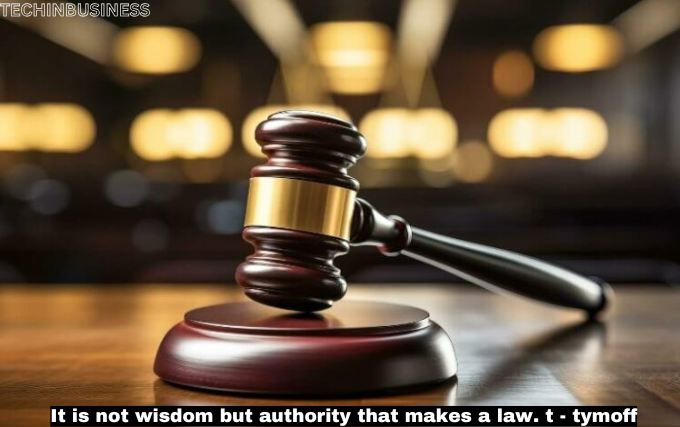Laws form the backbone of any society, providing structure, order, and a framework for resolving conflicts. The famous saying, “It is not wisdom but authority that makes a law,” often attributed to Tymoff, raises a thought-provoking question about the true essence of legal systems: Is law based on wisdom, or is it simply an exercise of authority? In this article, we’ll delve into the meaning of this statement, the implications of authority in lawmaking, and the balance between wisdom and power in shaping a just society.
Understanding the Concept
Decoding the Statement
The phrase “It is not wisdom but authority that makes a law” suggests that laws are often established not because they are inherently wise or just, but because the authority enacting them has the power to do so. While wisdom implies rationality and moral consideration, authority represents the ability to enforce decisions, whether or not they are ethically sound.
This dynamic is crucial to understanding the history and functioning of legal systems worldwide. Throughout history, the authority of rulers, governments, or legislative bodies has shaped laws, often prioritizing power over fairness or wisdom.
Authority vs. Wisdom
- Authority: The legitimate or coercive power to create and enforce laws.
- Wisdom: The ethical, rational, and thoughtful approach to determining what is right or just.
The Role of Authority in Lawmaking
Authority as the Foundation of Law
The essence of law lies in its enforceability. Without authority, laws become mere suggestions. Authority ensures:
- Enforcement: The ability to compel obedience through sanctions.
- Consistency: Establishing a unified set of rules for everyone to follow.
- Stability: Preventing chaos by providing clear guidelines.
Historically, authority has often been wielded by monarchs, religious leaders, or elected officials. In many cases, this authority was unquestioned, leading to laws that reflected the interests of the ruling class rather than the wisdom of equitable governance.
Examples of Authority-Driven Laws
- Ancient Monarchies: Laws were decrees from kings or emperors, enforced without question.
- Colonial Rule: Colonial powers imposed laws to maintain control over territories, often ignoring the needs or wisdom of local populations.
- Modern Legislatures: Elected bodies may pass laws based on political agendas, sometimes disregarding expert advice or public opinion.
The Risks of Authority Without Wisdom
Authoritarianism and Arbitrary Laws
When authority operates without wisdom, the results can be catastrophic. Authoritarian regimes have historically used their power to create oppressive laws that serve their interests rather than the greater good.
Case Studies:
- Nazi Germany: The authority of the Nazi regime led to laws that legitimized persecution, genocide, and systemic oppression.
- Apartheid South Africa: Laws enforcing racial segregation were created and enforced by a ruling minority, ignoring the principles of justice and equality.
The Danger of Disconnection
Authority without wisdom often results in:
- Unjust Laws: Rules that marginalize, discriminate, or exploit certain groups.
- Lack of Public Trust: Citizens lose faith in the legal system when laws lack fairness.
- Social Unrest: Unwise laws can lead to protests, rebellion, and societal collapse.
Wisdom in Lawmaking
The Role of Wisdom in Shaping Just Laws
While authority provides the power to enforce laws, wisdom ensures those laws are ethical, rational, and beneficial to society. A wise approach to lawmaking considers:
- Moral Principles: Upholding values like justice, equality, and human dignity.
- Practicality: Ensuring laws are enforceable and effective.
- Long-Term Impact: Anticipating the future consequences of legislation.
Examples of Wisdom in Lawmaking
- The U.S. Constitution: Designed to balance authority with wisdom, incorporating checks and balances to prevent misuse of power.
- Universal Declaration of Human Rights: A global framework based on principles of equality and justice.
Striking the Balance: Authority and Wisdom
The Ideal Legal System
A just and effective legal system strikes a balance between authority and wisdom. This balance can be achieved through:
- Democratic Processes: Allowing diverse voices to influence lawmaking.
- Expert Consultation: Involving scholars, scientists, and ethicists in legislative processes.
- Judicial Oversight: Courts ensuring laws align with constitutional principles and human rights.
Modern Challenges
- Populism: Laws driven by popular demand may lack long-term wisdom.
- Globalization: Balancing national authority with global ethical standards.
- Technological Advances: Addressing issues like data privacy and artificial intelligence responsibly.
Tymoff’s Quote in Contemporary Context
The statement, “It is not wisdom but authority that makes a law,” resonates strongly in today’s world. As societies grapple with issues like climate change, inequality, and technological disruption, the interplay between authority and wisdom is more critical than ever.
Lessons for Modern Governance
- Empower Ethical Leaders: Authority should be vested in those committed to serving the public good.
- Encourage Public Participation: Citizens should have a say in shaping the laws that govern them.
- Promote Accountability: Authorities must be held accountable for the impact of their decisions.
Conclusion
The quote “It is not wisdom but authority that makes a law” underscores the power dynamics inherent in legal systems. While authority is essential for the enforcement of laws, wisdom ensures these laws are just and equitable. A balanced legal system requires both—authority to establish and enforce rules and wisdom to guide them toward the greater good. By understanding this balance, societies can strive to create laws that are not only authoritative but also wise, fostering justice, trust, and harmony.


